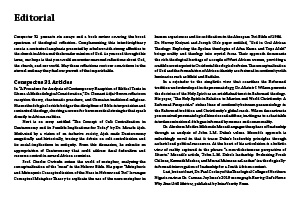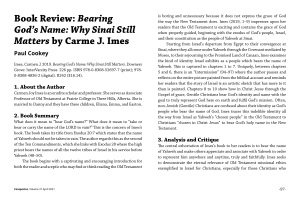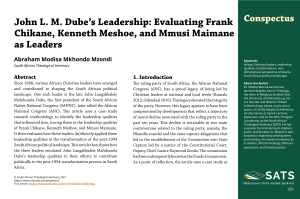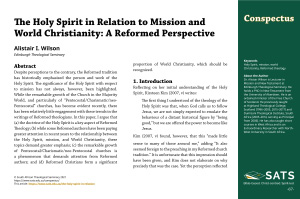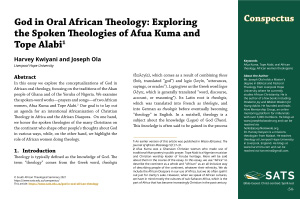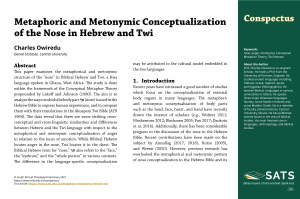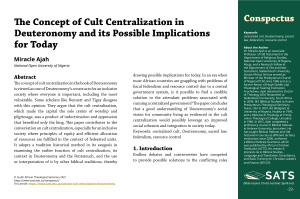A Procedure for Analysis of Contemporary Reception of Biblical Texts in Ghana: A Methodological Consideration
Keywords: Reception theory, horizon of expectations, the influence of language, concept of play, uses, gratifications
This essay hypothesizes that the contemporary reception of biblical concepts by Ghanaian charismatic preachers is influenced by beliefs and practices of traditional, religious, and cultural conceptions. This hypothesis is investigated by the analysis of the socio-historical context of the preacher’s community obtained through qualitative analysis of existing data and interviews…Book Review: Bearing God’s Name: Why Sinai Still Matters by Carmen J. Imes
What does it mean to “bear God’s name?” What does it mean to “take or bear or carry the name of the LORD in vain?” This is the concern of Imes’s book. The book takes its title from Exodus 20:7 which states that the name of Yahweh should not be taken in vain. The author regards this as the second of the Ten Commandments, which she links with Exodus 28 where the high priest bears the names of all the twelve tribes of Israel in his service before Yahweh (48–50).
John L. M. Dube’s Leadership: Evaluating Frank Chikane, Kenneth Meshoe, and Mmusi Maimane as Leaders
Keywords: African Christian leaders, leadership qualities, transformation, non-dichotomous perspective of Ubuntu, South African political landscape
Since 1898, various African Christian leaders have emerged and contributed to shaping the South African political landscape. One such leader is the late John Langalibalele Mafukuzela Dube, the first president of the South African Native National Congress (SANNC), later called the African National Congress (ANC). This article uses a case study research methodology to identify the leadership qualities that influenced him, tracing them to the leadership qualities of Frank Chikane, Kenneth Meshoe, and Mmusi Maimane…The Holy Spirit in Relation to Mission and World Christianity: A Reformed Perspective
Keywords: Holy Spirit, mission, world Christianity, Reformed theology
Despite perceptions to the contrary, the Reformed tradition has historically emphasized the person and work of the Holy Spirit. The significance of the Holy Spirit with respect to mission has not always, however, been highlighted. While the remarkable growth of the Church in the Majority World, and particularly of “Pentecostal/Charismatic/neo- Pentecostal” churches, has become evident recently, there has been relatively little engagement with these trends in the writings of Reformed theologians…God in Oral African Traditional Theology: Exploring the Spoken Theologies of Afua Kuma and Tope Alabi
Keywords: Afua Kuma, Tope Alabi, oral African theology, African women theologians
In this essay we explore the conceptualizations of God in African oral theology, focusing on the traditions of the Akan people of Ghana and of the Yoruba of Nigeria. We examine the spoken-word works—prayers and songs—of two African women, Afua Kuma and Tope Alabi. Our goal is to lay out an agenda for an intentional Africanization of Christian Theology in Africa and the African Diaspora…Metaphoric and Metonymic Conceptualization of the Nose in Hebrew and Twi
Keywords: nose, anger, metonymy, Conceptual Metaphor Theory, Twi Hebrew
This paper examines the metaphorical and metonymic structure of the “nose” in Biblical Hebrew and Twi, a Kwa language spoken in Ghana, West Africa. The study is done within the framework of the Conceptual Metaphor Theory propounded by Lakoff and Johnson (1980). The aim is to analyze the ways in which the body part אַף (nose) is used in the Hebrew Bible to express human experiences, and to compare them with their translations in the Akuapem Twi Bible (ATB 1964)…The Concept of Cult Centralization in Deuteronomy and it Possible Implications for Today
Keywords: centralized cult, Deuteronomy, sacred law, federalism, resource control
The concept of cult centralization in the book of Deuteronomy is viewed as one of Deuteronomy’s constructs for an inclusive society where everyone is important, including the most vulnerable. Some scholars like Bennett and Tigay disagree with this opinion. They argue that the cult centralization, which made the capital the sole center of worship and pilgrimage, was a product of indoctrination and oppression that benefited only the king…Conspectus 31
April 2021

